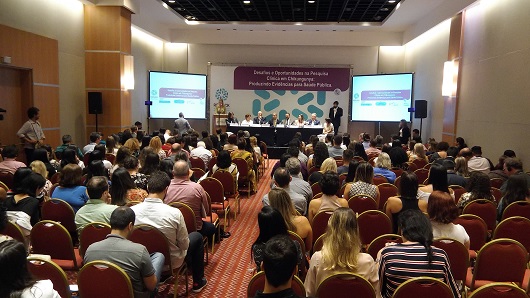Chikungunya: Replick Network is launched in Rio de Janeiro
12/06/2019
Antonio Fuchs (INI/Fiocruz)
The Network of Clinical and Applied Research into Chikungunya (Replick), an initiative resulting from the partnership between the Evandro Chagas National Infectiology Institute (INI/Fiocruz), the Ministry of Health and the Pan-American Health Organization (Opas/OMS), was launched on May 10, during the Symposium; Challenges and Opportunities in Clinical Research into Chikungunya: Producing Evidence for Public Health. Replick involves professionals from 25 research and teaching institutions in nine Brazilian states.
The opening table of the event included the presence of Valdiléa Gonçalves Veloso dos Santos, director of INI/Fiocruz; Marco Aurélio Krieger, vice-president of Production and Innovation in Health (VPPIS/Fiocruz); Denizar Vianna, secretary of Science, Technology and Strategic Inputs (SCTIE/MS); Julio Croda, director of the Department of Surveillance of Transmissible Diseases (Devit/SVS/MS); Camile Sachetti, representing the Department of Science and Technology (Decit/SCTIE/MS); Cristina Lemos, representative of the Municipal Secretariat of Health of Rio de Janeiro; Carlois de Mello, representative of the Pan-American Health Organization (Opas/OMS), and Sinval Brandão Filho, president of the Brazilian Society of Tropical Medicine (SBMT).

“As a researcher I know how difficult it is to structure a network of this size, for this reason I want to congratulate all those in INI involved in this process and thank the Ministry of Health for the partnership, because without the support of the administrators we would not have been able to implement it. It is essential to highlight the importance of this work for it very much characterizes the role of our Institute, our capacity to respond to Public Health threats quickly. We have actively worked on various epidemics over the years and I think about the importance of maintaining this network articulated, the group prepared, to respond as quickly as possible to other epidemics that will certainly come”, highlighted the director of INI/Fiocruz, Valdiléa Veloso.
“The Network is only one of the examples of how Brazil can be organized to give effective responses in the fight against different epidemics, in this specific case, chikungunya”, emphasized Marco Krieger (VPPIS/Fiocruz). During his speech, Krieger also referred to the role of Fiocruz in technological development, in the assays and clinical trials, taking advantage of the hospitals and out-patient services existing in its units. Furthermore, he highlighted the production of inputs for the [Single Health System] SUS, an institution which has Health as a promotor of citizenship and employment of around 10% of the national workforce in the area.
Denizar Vianna (SCTIE/MS), Julio Croda, (Devit/MS) and Carlois de Mello (Opas/OMS) recalled the challenge that administrators of all areas currently face with the epidemics that plague the country, specifically regarding the arboviruses. All of them stressed that regionality is one of the key factors for this problem, since these diseases present different behaviors. According to them, the treatment of the population must be adapted to each place and they were unanimous in stating that involvement with the academy is fundamental for this to be possible.
The proposal of the Replick Network is to accompany a group of two thousand patients, from the diagnosis to the clinical management of chikungunya, consolidating data and experiences successfully implemented in the SUS to improve protocols, thus alleviating the impacts of the disease on the health of the population. By involving an extensive and diversified range of professionals, such as physicians (infectiology specialists, rheumatologists and clinicians), nurses, pharmacists, biologists, economists, social scientists, among others, the Network is an articulate group that can serve as a model for other actions in the country.
The coordinator of the Fiocruz Strategy for the 2030 Agenda, Paulo Gadelha, spoke about this universal, indivisible and integrated plan of action that aggregates the economic, social and environmental dimensions in search of social development starting from 5Ps: People, Planet, Prosperity, Peace and Partnerships. Gadelha emphasized that Brazil played a leading role in the construction of the 2030 Agenda by seeking to give more visibility to social issues and incorporating the theme of Health and the recognition of the central role of Science, Technology and Innovation.
Replick Network
The lead researcher of Replick and member of the team of the Laboratory of Clinical Research in Acute Diseases of INI/Fiocruz, the infectious disease specialist, André Siqueira presented the Clinical and Applied Research Network in Chikungunya. Comprising 25 research and teaching institutions in nine states, the Network involves about 40 researchers focused on investigating how the disease affects the lives of the population not only in clinical but also economic, psychological and social terms. The work will be done jointly with municipal and state administrators and with the Ministry of Health to discuss important points to be investigated over the next three years in a group of about two thousand people across the country. Replick is funded by the Department of Surveillance of Communicable Diseases (Decit/SVS/MS) and was based on the successful experience of Redezika, which integrates administrators, researchers and civil society in coping with the zika virus and its impacts.
The study is divided into four thematic axes: clinical, translational, therapeutic and epidemiological. "The clinical aspect defines how to measure the involvement of chikungunya and evaluate the improvement or worsening of the patients. In the translational part we will investigate markers and factors associated with the clinical manifestations, risks of chronicity and complication of the disease. In the therapeutics we will address the different types of treatment, either medicated or complementary, such as Integrative and Complementary Practices in Health (PICS). Finally, in the epidemiological axe we will discuss other studies to understand the extent of the disease in order to include bodies of research that present the socioeconomic and psychic impacts caused in patients, "said André.
"We are searching for data to better understand the disease and ways to ease the suffering of people. We had an impression that the chikungunya caused pain and not death, but that view is being revised. Our studies will evaluate this better to propose solutions for this serious health problem that is present in our country”, he said.




